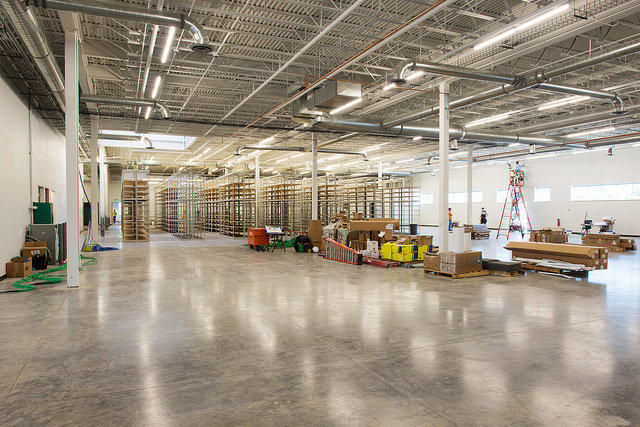Last week, WIRED published an article examining the startup industry in places other than the coasts by asking the question, “Can the American Heartland Remake Itself in the Image of Silicon Valley?” As a founder of a tech company (although not in the vein of the rapidly scalable and wildly popular SaaS ventures) in the American heartland, I took a look. I appreciated the points the author made about the limited access to venture capital and the constraints on available talent outside major metropolitan centers like San Jose, Los Angeles and New York. However, it also gave me an opportunity to reflect on the story of SparkFun’s founding and consider whether Colorado’s economy and culture provided its own advantages to our growth. A copy of my letter to the editor is below. I’d love to hear any thoughts on your experience with startup communities and the advantages or disadvantages to whichever region you found yourself in.
This morning when I read Vauhini Vara’s piece, “Can the American Heartland Remake Itself in the Image of Silicon Valley?” I couldn’t help reflecting on the stories of all the tech companies on the Front Range that succeed without venture capital.
I am one of those Colorado startup founders. I started an open source hardware company, SparkFun Electronics, in 2003 as a CU student. In the almost 15 years we’ve been in business, we’ve never taken any venture capital or outside investment. Ms. Vara discussed at length the plight of many local startup founders whose access to VC and talent are so limited here that it’s unlikely the Heartland will ever truly cultivate the success our Bay Area friends have been experiencing for several decades now.
I was able to start SparkFun without investors precisely because I wasn’t in Silicon Valley. In those beginning stages, I never would have been able to pay for warehouse space in the Bay Area while waiting for investors to commit, let alone prioritize a socially responsible and sustainable enterprise, or put my employees first from day one to build a culture based on open source values of collaboration, transparency and the pursuit of innovation. We currently manufacture nearly 500 products at our Boulder, CO, headquarters; with the cost of space and labor in California, we would never have been able to support the workforce we have today and produce so many goods in the United States.
Ross’ story in Ms. Vara’s article conflates the challenges of starting any business with the challenges of attracting investors. As an engineer, I started a company that I knew how to build and implement on my own – I didn’t need to rely on anyone else to establish that MVP threshold. I had my hands on every aspect of SparkFun when I started it: setting up the site, designing the product, taking the photos, dropping the boxes off at FedEx (because they wouldn't pick up from a student apartment), answering the phone when it rang, etc. It took incredible time and energy to manage all aspects of the business for many years (yes, on top of school, and a job to pay for school, and having meaningful relationships). But the upside was that I could push as hard on the throttle as I was able, and I was in an environment where I could take bigger risks because the financial stakes were lower.
And now, with my business operating at scale and delivering electronics worldwide every day, we attract talent from all over the country who relocate to the Front Range in pursuit of a lifestyle that the coasts can’t offer. As a 100 percent employee-owned company, our employees are our most important stakeholders, as they are also our shareholders. Because we don’t have outside investors, we are able to prioritize a profitable values-driven business. Silicon Valley can keep their games; we’re playing a different one.








To Nate & Glenn’s credit, it appears Sparkfun's leadership transition from its entrepreneurial founder to a professional manager has gone well and the founder is still involved in the company. This is not the norm under the Silicon Valley model.
Thanks! It has gone extremely well. And I agree, it's rare to have a successful transition, especially in Silicon Valley.
Nate, I can honestly say the Nokia LCD screen and breakout board I ordered back in 2006 had a larger impact on my early career as an electrical engineer than anything out of silicon valley.
:O That was an oldie! Look at that old SparkFun logo. I remember finding a color LCD for really cheap and when it lit up for the first time our minds were blown. Glad you enjoyed it as well!
Continue to be impressed by your ability to stick it to the "business as usual" class while proving success is possible in alternative, open ways. You're an inspiration to us all Nate!!! x Tris
Wow: just noticed that this poster has a numerical ID above 1 Meeeeeeeeelion! Are there actually more than 1,000,000 customer accounts?? If so, that alone attests to Sparkfuns success!
Well said! I served my time at a SV startup, and what I found was that Talent was actually very hard to find. All of our key players were imports, from other parts of the US and other parts of the world. The Awesome engineers that everyone is fighting for in SV ... have jobs, and are happy with them... what is available, is the team from the last failed VC funded disaster looking for jobs..
I love what you have done with Sparkfun Nate, and Have enjoyed the journey. I credit you for where I am in the industry, Thanks for your inspiration!
PS... bring back flying to AVC please :) loved 2014!
Do not disagree with the young Mr. Seidle's comments. But methinks that both himself and the Wired writer have missed some important 'features'.
SF actually makes stuff. SF adds to our GDP by selling physical goods that have real value. Conversely, much of the SV hoopla is based on services - JS/PHP, and other such nonsense that, while can have some value as IP, remain abstractions with no tangible, measurable, immutable value.
And the other big difference and point (not the one on my head). The article's protagonists is yet another unethical, non-engineer, big-payout wannabe. Our local hero (Seidle) has grown in a controlled and disciplined manner without depending on the Big Exit. Common examples external to SF (that would be familiar to this group) of disciplined, ethical business models are PJRC and Adafruit; so it is done outside of SV - if not just trying to hatch another get-rich-quick scheme/scam.
Great Post Nate!
Keep on Truckin!
Completely agree on this
You may not have the "successes" (however anyone wants to define that) of Silicon Valley, but you also don't have the spectacular failures of Silicon Valley either. And I think the graph showing the median rents shows why so much VC money goes to Silicon Valley...you have to make $250,000/year in order to live in a cardboard box out there.
I say Silicon Valley can have their "success".
Well done Nate. Any plans to grow/expand?
Always! We know SparkFun needs to grow so that the amazing people that work here get new opportunities. To answer your question specifically there is no crazy outlandish Juicero-type product plans, just new fun things (I posted the water resistant OLED just now) and collaborations. I'm heads down in a list of product ideas longer than we can pull the trigger on so the future looks very good.
As an Intel engineer in the 1980s and 90s, I had the jarring experience of observing SV entrepreneurial culture at first hand. I formed the impression that it was largely frat-boy culture, devoid of intellectual rigor. Instead, it was reliant upon the flim-flam of slick power point presentations by tall, glib, good-looking white males whose rosy business plans were based on dozens of unknowable embedded assumptions. In 2017, SV entrepreneurial culture remains essentially unchanged, except that the males are drawn from around the world. In contrast, I applaud what Sparkfun has done. Hats off to Nate and his entire group of employees.
Thank you for reminding me why I stay local. Adafruit is also an awesome open source hardware company that deserves support(plenty of east coast people for that), but Sparkfun is a huge plus for us in the Rocky Mountain area. I hope you keep your mission alive and well. We need you. You have a top quality organization.
SV start-ups are like other forms of prospecting that can only be sustained with massive amounts of money. If you use enough money you can make most any idea look good to other people who in turn put more money into the system. The question of actual, sustainable value seems silly when your goal is to leverage and de-leverage money ahead of the curve and leave with your margins in tact. Some good companies come out of the process, but mostly I think currency gets devalued and we continue to pervert the ideas of profit and industry till we actually believe that VC funded start-ups are a defining feature of capitalism. I like sparkfun's approach better :)
In silicon valley, Sparkfun would be considered a "lifestyle" business, one where the immediate owners can pay bills with profits, but the growth is not there to significantly impact the returns of the venture fund. VCs dislike these businesses. However, most of the "grass roots" value to society from businesses comes from those lifestyle businesses, not from the megacorps that silicon valley is set up to conceive and grow. In fact, because of this structure, it's actually harder to build a small, sustainable business in SV than on the heartland, unless your business revolves around providing value to those trying to build megabusinesses.